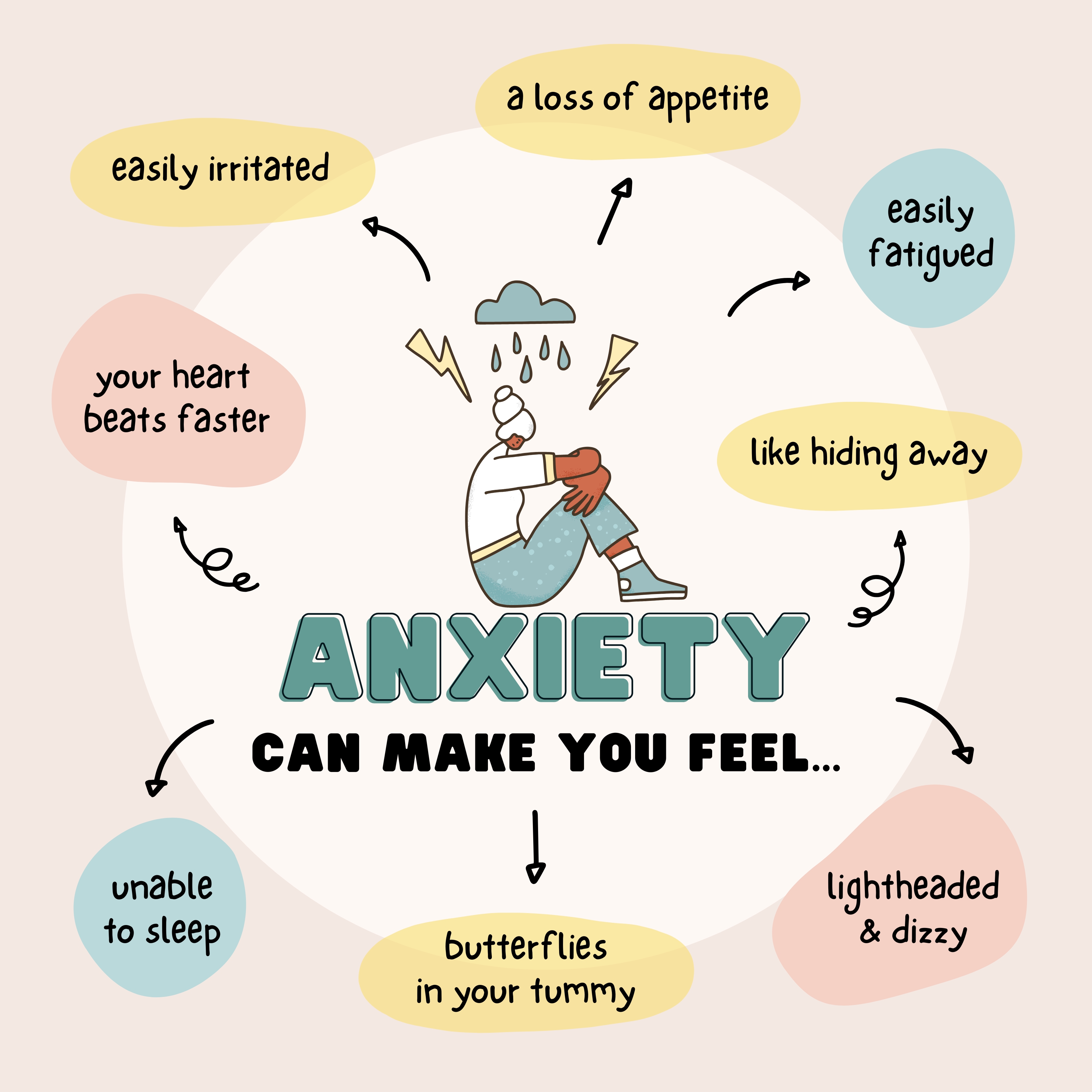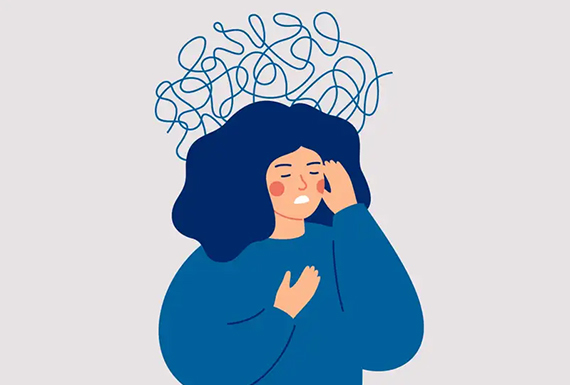Checking Out Various Techniques in Therapy for Anxiousness Problem for Lasting Change
When taking on anxiety conditions, it's important to check out a range of counseling techniques. Each approach supplies distinct understandings and tools to help you manage your symptoms properly. You could discover that integrating strategies can yield the most effective outcomes. Nonetheless, understanding the subtleties of these approaches is key to promoting long lasting modification. What if the right mix could launch a new degree of psychological wellness for you?
Understanding Anxiety Problems: A Brief Summary
Anxiety problems, which impact millions of individuals worldwide, can substantially affect life. You could experience frustrating feelings of fear or stress that seem uncontrollable. These feelings can cause physical symptoms like a racing heart, sweating, and even lightheadedness. Common kinds of anxiety disorders include generalised anxiety problem, panic condition, and social anxiousness problem. Each has distinct indicators, however they all share a propensity to disrupt your regular and relationships.Understanding the source of your anxiety is essential. It might originate from genetics, brain chemistry, or life experiences. Identifying your triggers can assist you handle your responses much better. It is very important to keep in mind that you're not the only one in this struggle. Lots of people encounter similar obstacles, and seeking aid is a strong action toward sensation better. By discovering stress and anxiety conditions, you're currently on the course to understanding and managing your condition better.
Cognitive-Behavioral Therapy: Challenging Unfavorable Idea Patterns
In Cognitive-Behavioral Therapy, you'll begin by identifying the negative idea activates that add to your anxiety. You'll function on replacing them with more favorable alternatives when you recognize these ideas. With each other, you'll develop reliable coping techniques to assist manage your stress and anxiety in everyday circumstances.
Identifying Adverse Thought Triggers

When you encounter moments of distress, recognizing the particular triggers behind your unfavorable thoughts can be essential in managing anxiety. Begin by paying interest to circumstances that provoke feelings of fear or anxiety. Is it a jampacked area, a forthcoming target date, or a discussion with specific people? Jot down these circumstances in a journal. This will certainly aid you determine patterns in your thinking. Also, notification physical experiences that accompany your unfavorable thoughts, like a racing heart or rigidity in your breast. By pinpointing these triggers, you acquire insight into what's fueling your anxiety. Recognizing these connections is the first action in challenging those ideas and eventually gaining back control over your emotional feedbacks.
Replacing Ideas With Positives
Challenging unfavorable idea patterns is a necessary action in transforming your mindset and minimizing anxiety. You may usually find on your own entraped in cycles of self-doubt or disastrous reasoning. Rather than letting these ideas determine your sensations, practice replacing them with favorable affirmations or sensible choices. For circumstances, when you think, "I can't handle this," move it to, "I can handle obstacles one step at once." This basic adjustment can greatly affect your mood. Consistently identifying and countering these negative thoughts helps produce a healthier interior dialogue. Remember, it requires time and initiative, yet continually exercising this strategy can bring about lasting change, empowering you to face anxiousness with restored self-confidence and durability.
Structure Coping Approaches Together
Changing adverse ideas is just the start of handling stress and anxiety efficiently. To produce long lasting change, you need to construct coping approaches that equip you. Cognitive-Behavioral Therapy (CBT) helps you identify and test those unhelpful idea patterns. Together, you and your therapist can discover exactly how these thoughts impact your feelings and behaviors.Start by creating functional techniques, like journaling or mindfulness workouts, that allow you to face anxiety head-on. When you encounter your concerns slowly, you'll learn to respond in different ways.

Mindfulness and Acceptance-Based Approaches: Cultivating Present-Moment Recognition
As you browse the complexities of anxiousness, including mindfulness and acceptance-based approaches can considerably enhance your capability to cultivate present-moment awareness. By concentrating on the below and currently, you'll discover that you can observe your ideas and sensations without judgment (Counseling services for anxiety). This practice assists you recognize your anxiety without feeling bewildered by it.Engaging in mindfulness workouts, such as deep breathing, body scans, or led meditations, enables you to ground on your own in your current experience. Acceptance-based techniques motivate you to embrace your feelings as opposed to fight against them. When you accept your sensations, they lose their power over you.Incorporating these techniques right into your daily regimen can transform how you respond to anxiety. You'll establish resilience and discover to navigate demanding scenarios with better ease. Eventually, cultivating present-moment awareness lays the foundation for long lasting adjustment, empowering you to lead a more satisfying life
Exposure Treatment: Facing Anxieties Progressively
Direct exposure treatment helps you confront your worries in a steady means, making it much less frustrating. You'll discover techniques to encounter anxiety-provoking situations detailed, while additionally developing coping methods to handle your reactions. This method empowers you to take control and decrease stress and anxiety gradually.
Progressive Exposure Strategies

When encountering stress and anxiety, progressively challenging your worries can be an effective method to regain control. This strategy, referred to as steady exposure, entails slowly revealing on your own to the situations or things that activate your stress and anxiety. Beginning with less intimidating situations and progressively work your method up to more difficult ones. As an example, if you're worried of public talking, you might begin by talking in front of a mirror, after that proceed to sharing ideas with a good friend, and ultimately resolve a small team. Each action helps desensitize you to the worry, constructing your confidence in time. Keep in mind, it's important to speed on your own and commemorate small triumphes as you move through this process, strengthening your capability to manage stress and anxiety effectively.
Building Coping Methods
Structure reliable coping techniques is crucial for managing anxiety, particularly as you face your fears progressively - Counseling services for anxiety. One powerful approach is direct exposure treatment, where you begin by encountering your fears in a controlled fashion. Start with much less daunting circumstances and gradually function your means approximately even more tough circumstances. This steady direct exposure helps desensitize you to anxiousness causes, making them less overwhelming.Incorporate leisure methods, such as deep breathing or mindfulness, to soothe your mind during exposure. Track your progress, commemorating little success along the method to improve your confidence. Remember, it's okay to take your time; the objective isn't excellence however consistent enhancement. By building these strategies, you'll encourage on your own to navigate anxiety and welcome life a lot more completely
Psychodynamic Therapy: Revealing Source of Anxiety
Psychodynamic treatment discovers the unconscious mind, revealing the source of your stress and anxiety. By examining your ideas, sensations, and past experiences, this strategy assists you uncover underlying problems and unsolved problems that may add to your existing anxiousness. You'll work with a specialist to explore childhood years experiences, partnerships, and emotional patterns that form your responses today.As you obtain insight into these much deeper layers of your subconscious, you'll start to acknowledge how previous events influence your present actions. This understanding can lead to catharsis, allowing you to refine feelings you might have suppressed.Through the healing partnership, you can likewise determine defense devices that may have created with time, using a clearer course to change. Eventually, psychodynamic therapy outfits you with the tools to address your anxiousness at its core, promoting enduring makeover in your psychological health.
Integrative and Alternative Approaches: Combining Strategies for Greater Efficacy
Incorporating numerous therapeutic techniques can improve your trip towards managing stress and anxiety better. By integrating aspects from cognitive-behavioral treatment, mindfulness techniques, and holistic methods, get more info you can produce a tailored strategy that addresses your distinct requirements. You may utilize cognitive-behavioral methods to test unfavorable thought patterns while incorporating mindfulness exercises to ground yourself in the existing moment.Additionally, discovering all natural techniques such as yoga exercise or meditation can promote relaxation and reduce anxiousness signs and symptoms. This mix enables you to develop greater self-awareness and resilience.Experimenting with these diverse approaches can aid you find what resonates most with you. Remember, it's concerning locating a harmony that works, instead of adhering to a solitary method. This integrative method not only offers prompt alleviation however also cultivates lasting skills for managing anxiety, equipping you to reclaim control over your life.
The Function of Support Systems: Structure Strength Via Link
While it could seem that managing anxiousness is a singular journey, having a solid support system can play an important role in your strength. Surrounding on your own with compassionate good friends, household, or support system creates a safe room where you can honestly share your experiences and sensations. When you get in touch with others, you advise yourself that you're not the only one in this struggle.These connections provide encouragement and can give useful coping strategies that have actually benefited others. It's likewise an opportunity to acquire point of view; buddies can assist you see situations in a different way, lowering feelings of isolation.Moreover, psychological assistance fosters a sense of belonging, which can substantially relieve anxiety symptoms. By leaning on your support group, you can construct resilience and deal with difficulties better. Remember, connecting for assistance suggests stamina, and it can make all the distinction in your trip towards taking care of anxiety.
Frequently Asked Concerns
What Are the Typical Signs of Anxiousness Problems?
You could experience uneasyness, tiredness, trouble concentrating, irritability, muscle tension, and rest disruptions. Physical symptoms can consist of quick heart beat, sweating, and shivering. Recognizing these signs early can help you look for appropriate assistance and therapy.
How Much Time Does Treatment Generally Last for Anxiety Disorders?
Therapy for anxiety disorders generally lasts anywhere from a few weeks to several months. It truly depends on your individual requirements, development, and the methods your therapist uses to assist you manage your stress and anxiety efficiently.
Can Medication Be Used Along With Treatment for Stress and anxiety?
Yes, medication can certainly be used along with treatment for anxiousness. Integrating both methods typically enhances therapy performance, assisting you manage symptoms while discovering underlying problems through therapy (Counseling services for anxiety). Always consult your doctor for tailored recommendations
Are There Self-Help Approaches for Handling Anxiety?
Yes, there are numerous self-help techniques for taking care of stress and anxiety. You can exercise mindfulness, take part in regular exercise, keep a balanced diet regimen, establish a regular, and use deep breathing strategies to help in reducing stress and anxiety signs and symptoms efficiently.
Just how Do I Know if I Need Specialist Help for Stress And Anxiety?
